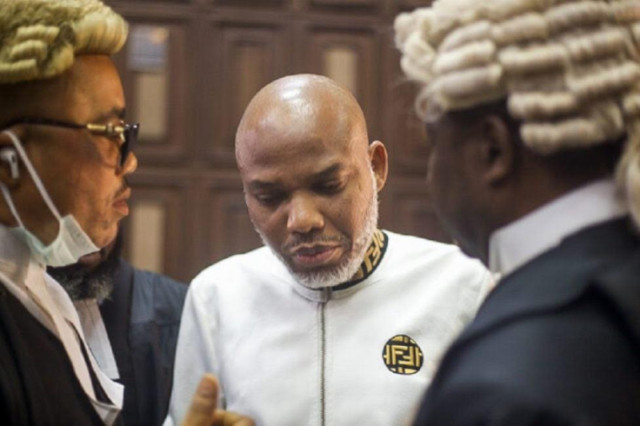A Federal High Court sitting in Abuja presided by Justice James Omotosho on Monday dismissed the fundamental human rights suit filed by the detained leader of the Indigenous People of Biafra (IPOB) Nnamdi Kanu against the Federal Government.
Kanu, in the suit, is seeking N1 billion in damages from the Attorney-General of the Federation and the Department of State Services (DSS) for alleged rights violation.
According to the suit by Kanu, marked: FHC/CS/1633/2023, he claimed that the DSS and its Director-General violated his rights to a fair hearing by allegedly preventing his lawyers from having unhindered interactions with him where he is being detained in preparation for his defence in his criminal trial.
Omotosho, while delivering a judgment on the suit, held that Kanu failed to provide credible evidence to sustain his claims that his interactions with his lawyers were interfered with, that he was denied unhindered access to his lawyers and that DSS officials eavesdropped on his conversations with his lawyers, which constituted a breach of his right to a fair hearing.
Omotosho further held that the applicant failed to prove that his lawyers were stopped from taking notes at meetings held with him during visitation, and further held that there was no evidence before him showing that he was denied a fair hearing as claimed in his suit.
Stemming from the above, the judge dismissed the suit for lacking in merit.
Recall that Kanu, through his lawyer, Aloy Ejimakor, in an originating motion dated and filed on December 4, 2023, sued the Federal Republic of Nigeria, the AGF, the DSS, and its DG, as 1st to 4th respondents respectively.
Kanu, in the suit, demanded the enforcement of his fundamental rights while in detention at the DSS.
The suit was filed under Order II, Rules 1 & 2 of the Fundamental Rights Enforcement Procedure Rules 2009, among others.
In the motion, Kanu prayed for “a declaration that the respondents’ act of forcible seizure and photocopying of confidential legal documents about facilitating the preparation of his defence which were brought to him at the respondents’ detention facility by his lawyers, amounted to a denial of his rights to be defended by legal practitioners of his own choice.”
He further sought a declaration that the respondents’ act of eavesdropping on his confidential consultations or conversations with his lawyers amounted to denial of his right, among others.
Kanu, on this note, sought an order of injunction restraining and prohibiting the respondents from their act of forcible seizure and photocopying of confidential legal documents brought to him at the detention facility by his lawyers.
He also sought an order mandating the respondents to jointly and severally pay the sum of N1bn as damages for the mental, emotional, psychological and other damages he suffered as a result of his rights’ breach, among others.
The FRN and the AGF, in a counter affidavit, urged the court to dismiss the suit for being an abuse of court process.
The DSS, in a counter affidavit dated and filed on March 12, 2024, denied the allegations levelled against it by Kanu.
In the application by a staff member in the service’s legal department, Yamuje Benye argued that 11 paragraphs in Kanu’s affidavit were untrue.
According to him, Kanu, alongside his counsel, was permitted to consult and interact on visiting days in one of the best interview facilities of the DSS to ensure maximum comfort of the applicant and his visitor(s).
He argued that there was no basis for eavesdropping and recording of Kanu’s conversations.
He said that in line with the Service Standard Operation Procedure of the State Security Service, all visitors to her facility are subjected to normal routine security checks and items in their possession are scanned.
Benye said the instant suit was an abuse of the court process, adding that Kanu had previously argued the same issues before Justice Nyako.
He added that their personnel never denied Kanu’s lawyers the professional liberty to perform their lawful duty of discussing, consulting, and interacting with him.
“Applicant’s counsel are allowed to moderate size notes or pads for the visit, but the exchange of materials that promote the IPOB ideals (subject matter of applicant’s criminal trial) were strongly resisted and refused.”




















